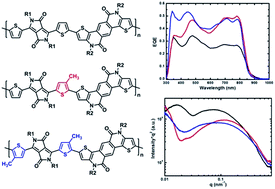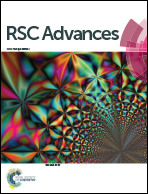Enhancing the photovoltaic performance of binary acceptor-based conjugated polymers incorporating methyl units†
Abstract
Three conjugated polymers incorporating pentacyclic lactam (PCL) and diketopyrrolopyrrole (DPP) units into conjugated polymers were designed and synthesized, in which the aromatic linkers between PCL and DPP varied from thiophene to methylthiophene. Methylated polymers were found to show slightly blue-shift absorption and high-lying energy levels compared to non-methylated polymers. The three polymers also exhibit good crystalline properties and hole mobilities up to 0.57 cm2 V−1 s−1 in field-effect transistors. Non-methylated polymers as electron donors in solar cells show an efficiency of 4.2% with a relatively low short circuit current density (Jsc) of 8.3 mA cm−2, while methylated polymers exhibit dramastically enhanced Jsc of 12.8 mA cm−2 and PCEs up to 6.1%. Micro-phase separation in bulk-heterojunction thin films were systematically investigated, in which methylated polymers in blended thin films were found to provide better micro-phase separation with small crystal domain. The observation can explain their improved photocurrent in solar cells. Our studies demonstrate that by intentionally structural modification, conjugated polymers containing several electron-deficient units can have the great potential application in high performance solar cells.


 Please wait while we load your content...
Please wait while we load your content...